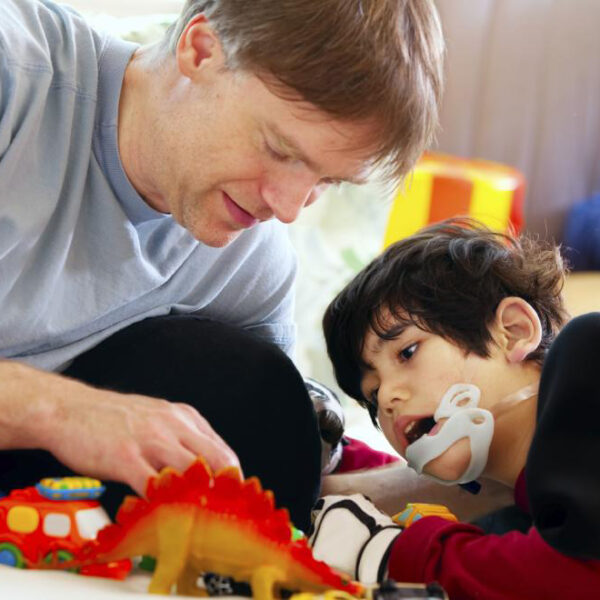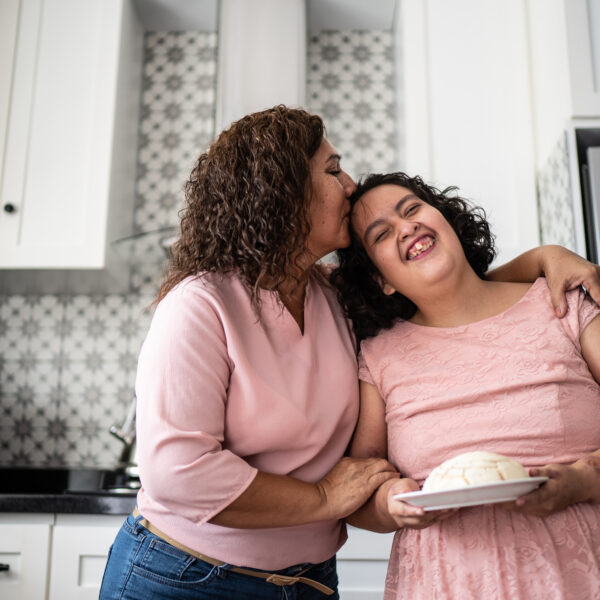Aids and equipment
If your child’s disabilities make it hard to manage everyday things such as mealtimes, going to the toilet or getting around, you may be able to get special equipment to make life easier.
Specialist equipment for your home
Things like special toilet seats, bath aids, ramps, hoists and slings can be loaned to you by your local social care or health service, after an assessment of your child’s needs.
In Brighton & Hove, the Royal Alexandra Children’s Hospital and the Children’s Disability Service at Seaside View currently share a store of specialist equipment. Occupational therapists and physiotherapists from the Children’s Disability Service will assess each child individually for the suitability of such equipment, which may then be available on short term loan. Speak to your health visitor, therapist or social worker about getting an assessment by the occupational therapy team at Seaside View.
In East Sussex, the Children’s Integrated Therapy and Equipment Service (CITES) provides equipment on loan to disabled children and young people in East Sussex from birth to school-leaving age (16 or 19). You can contact Children’s Integrated Therapy and Equipment Service directly via their website and you may be referred for an assessment of your needs.
For very specialised equipment, Chailey Heritage has a rehabilitation engineering unit, which will custom-make or specially adapt existing aids to suit your requirements. REMAP and MERU are national organisations who will try to make equipment to suit your child’s individual needs, which you may not be able to get anywhere else.
If your child needs specialist equipment in the classroom, you should discuss the situation with their school.
Buggies and wheelchairs
For buggies and wheelchairs, Brighton & Hove families will go to the Wheelchair and Seating Service at Sussex Rehabilitation Centre at Brighton General Hospital. Referral is usually by an occupational therapist or a physiotherapist.
In East Sussex, wheelchairs and buggies are provided by the East Sussex Wheelchair Service by Ross Care which can assess and equip you directly. You can contact them for information, but you will need to be referred by a healthcare professional such as a GP, occupational or physiotherapist, or nurse in the first instance.
Be aware that there may not be a huge range of wheelchairs immediately available for children. However, a personal wheelchair budget (PWB) is available to support a wider choice of equipment. The PWB can be used to add additional features to the wheelchair, opt for an alternative wheelchair within the available equipment list, or to support purchasing a third-party wheelchair. Ross Care produces some more detailed information about PWBs.
Whizz-Kidz is a charity which provides mobility equipment for children (wheelchairs, trikes, buggies). They may be able to help if the equipment you feel your child needs is not provided by your local wheelchair service or you wish to have additional features such as a rain cover fixed to the wheelchair. And if your child needs help and support with using their wheelchair, Go Kids Go run wheelchair skills workshops.
There’s lots of useful information about disability equipment for children, including buggies and wheelchairs on the Living Made Easy website.
Or you can visit the NHS website for information on wheelchairs and scooters.
Trying out equipment
There are frequent changes and developments in the kind of equipment and gadgets that are available, and it’s sometimes useful to be able to see what’s on offer and try things out.
It can be helpful to visit independent living exhibitions or centres. The Red Cross run short-term mobility equipment loan services in Hove and Bexhill-on-Sea where you can try out wheelchairs, toileting aids and other equipment. The Living Made Easy website has a huge database of equipment and manufacturers who may have showrooms where you can try out equipment.
There are large-scale annual exhibitions of disability equipment and useful gadgets such as Naidex. There are also adverts in disability magazines and local newsletters for second-hand equipment, or you can use the Disability Equipment Service to buy and sell second hand equipment once you have worked out what you want.
Paying for equipment
Disability equipment and aids will usually be free of charge if your child is assessed as needing them by local social care or health services. There is a limit of £1000 on free daily living equipment provided by the local authority.
You can also use direct payments to buy equipment if your child gets these as part of their social care support package.
If your child is not eligible for support from social care but you are on a low income, you may be able to apply to certain charities or foundations for help with buying the equipment you need. The Family Fund, for example, provides grants for specialist trikes and bicycles, computers and tablets, and sensory toys and equipment amongst other things.
If your child has a life-limiting illness, React can provide essential equipment and aids including that are not available through any local authority funding. This includes mobility and medical equipment, specialist furniture and home care items and equipment for education.
Get more information about grants, loans, savings & welfare assistance schemes on Contact’s website.






